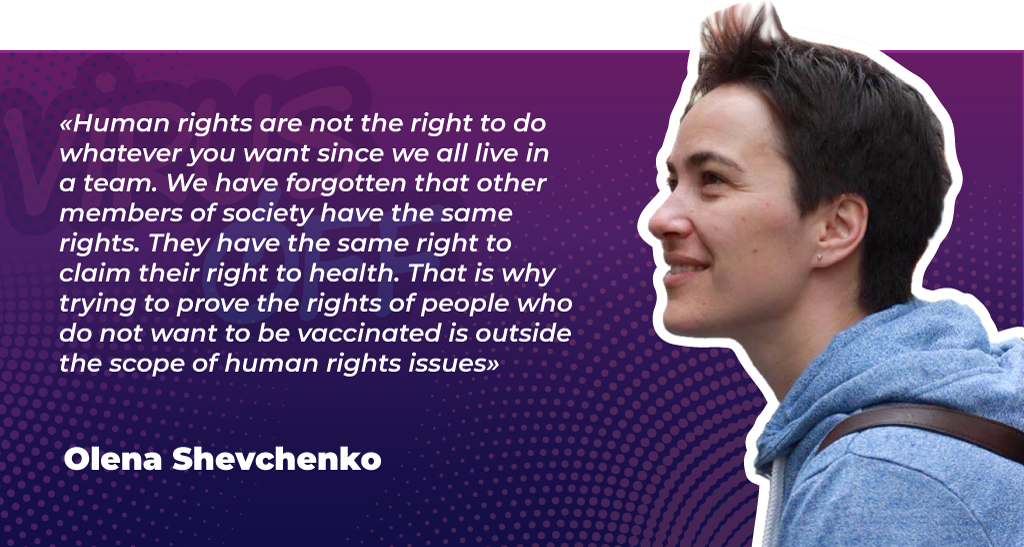The third wave of coronavirus raged in earnest in Ukraine. In recent days, records have been made for both mortality and the number of cases of COVID-19. The United Nations Children’s Fund in Ukraine (UNICEF) conducted a nationally representative survey, which showed that 54.6% of Ukrainians who have not yet been vaccinated will not get vaccinated, which significantly affects herd immunity. But, despite the anti-vaccination propaganda, there are labor collectives in Ukraine where 100% of employees are vaccinated. Why some people get vaccinated while others are “looking for the excuses,” said Olena Shevchenko, social activist, human rights activist, feminist, LGBT activist, board member of the ILGA World international organization, chairwoman of the public organization Insight (Ukraine).
Olena, as a human rights activist, do you think vaccination violates human rights?
Many are now pondering the issue of coercion to vaccinate (this can be called stimulation, but, of course, when there is almost no choice, it can be called coercion) and human rights. We see how “anti-vaccinators” actively began to use the human rights agenda, arguing their right not to get vaccinated, not adhere to quarantine, and not wear masks.
The question is difficult because we have devoted much effort to fighting for individual rights and freedoms. There is a kind of aggravation of the importance of individual rights and liberties, but (!) this is only at first glance because human rights are not the right to do whatever you want since we all live in a team. We have forgotten that other members of society have the same rights. They have the same right to claim their right to health. That is why trying to prove the rights of people who do not want to be vaccinated is outside the scope of human rights issues. Yes, there is a right not to be vaccinated, but another person has the right to demand to adhere to a physical distance (2 meters), not to be in a shared space, etc.

In the “Insight” organization, 100% of employees are vaccinated. Tell me honestly, was there any pressure on anyone?
If you think that I forced someone, then no (laughs). We have a position in our organization – “yes for vaccination”. We recommend that people get vaccinated because we support the country’s course towards general immunization of the population and the achievement of herd immunity.
Is there a preference for vaccines?
It is an interesting question because all the employees who work for us were vaccinated with different vaccines. There are people who, as soon as the first vaccine – Oxford/AstraZeneca, appeared, managed to make it; others got vaccinated with CoronaVac, the rest with Pfizer-BioNTech.
All people approached this issue quite responsibly, read a lot about vaccines, studied how they act. But ideally, it should be so that everyone can choose according to their medical indications. However, given that this is an emergency vaccination and the formulations of the drugs are not yet sufficiently tested, people used what was available at the time of vaccination.
How did you personally decide to get vaccinated? There is a lot of negative information about vaccination around. What would affect your decision?
I have always had a typical attitude towards vaccines; I have never belonged to those who believe in a kind of conspiracy. This question did not arise whether it was necessary to get vaccinated – this question did not occur – I simply did not want to get sick with coronavirus.
I got vaccinated in the summer; I was already ready to go for the first CoronaVac vaccination, but the opportunity to be vaccinated with Pfizer appeared, and I chose this vaccine. My decision was also influenced by whether I would have problems traveling to the countries of the European Union since not everywhere CoronaVac is recognized. Fortunately, my mother nor I had any adverse reactions, although everyone said that Pfizer was much worse tolerated, especially after the second dose. Everything here is very individual.
Olena, we know that Insight has filed a lawsuit demanding Patriarch Filaret to refute claims that same-sex marriage is the cause of the coronavirus pandemic. Would you please tell us a little about this?
Last year, in an interview with one of the local channels, an ex-patriarch of the UOC-KP Filaret said that he considers the spread of coronavirus “a punishment for homosexuality, above all, same-sex marriage.” We, the LGBT organization Insight, have filed a lawsuit because such statements are considered unacceptable at any time, and the dissemination of false, openly discriminatory information by a public person during a pandemic can lead to a wave of hate-motivated violence.
Our demands were straightforward – recognizing the disseminated information as unreliable and discriminatory and refuting it. For many members of the LGBT community, this is a matter of honor and dignity.
Is there already a court decision?
While everything is in progress, it is difficult to predict something because of the constant postponement of court sessions. At the moment, we plan to go all the way until we exhaust all national mechanisms: appeal and cassation. Further, perhaps, the European Court of Human Rights.
We believe in success. For instance, this week, we won the case for the homophobic attack in Lviv. The attackers were convicted of beating and robbery, one of them received an actual prison term – 4 years one month, the rest received suspended sentences. I think it is a clear signal that homophobia and transphobia will be punished in Ukraine. We are happy with this verdict because LGBT+ people have finally got a chance to be protected.
Olha Bula
This series was created with the support of UNAIDS




